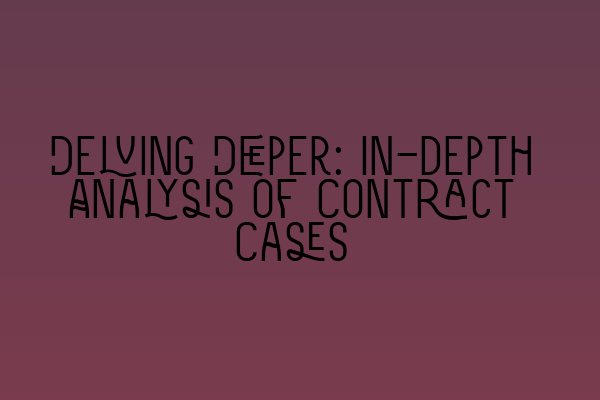Delving Deeper: In-depth Analysis of Contract Cases
Contracts are the backbone of any business transaction. They establish the rights, obligations, and responsibilities of the parties involved. However, when disputes arise, it becomes crucial to delve deeper into contract cases to understand the intricacies that can make or break a legal argument. In this blog post, we will conduct an in-depth analysis of contract cases, shedding light on key aspects that can influence their outcome.
1. Formation of the Contract:
The first step in analyzing a contract case is to examine its formation. This involves scrutinizing the offer, acceptance, consideration, intent to create legal relations, and capacity of the parties. Understanding the nuances of contract formation is essential to determine whether a legally binding agreement exists. For a comprehensive understanding of contract formation, consider exploring our related article on SQE 1 Practice Exam Questions.
2. Terms of the Contract:
Once the contract is formed, it is crucial to analyze its terms. Contracts can be either express or implied, and their interpretation plays a pivotal role in resolving disputes. Key factors to consider include the plain meaning of the words used, the intentions of the parties, trade usage, and previous dealings. Analyzing contract terms requires attention to detail and a comprehensive understanding of contractual interpretation principles. To enhance your knowledge in this area, we recommend reviewing our related article on SQE 1 Practice Mocks FLK1 FLK2.
3. Conditions and Warranties:
Differentiating between conditions and warranties can have a significant impact on the outcome of a contract case. Conditions are vital terms that go to the root of the contract, while warranties are ancillary obligations. Breach of a condition entitles the innocent party to terminate the contract, whereas breach of a warranty only leads to a claim for damages. Understanding the distinction between these two types of terms is essential for effectively analyzing contract cases. To sharpen your skills in this area, explore our related article on SQE 2 Preparation Courses.
4. Misrepresentation and Mistake:
Misrepresentation and mistake are common grounds for contract disputes. Analyzing their impact requires a thorough examination of their elements and legal implications. Establishing the presence of misrepresentation or mistake can lead to various remedies, such as rescission, damages, or specific performance. Delving deeper into these concepts is crucial for a comprehensive analysis of contract cases. To gain further insights, we recommend exploring our related article on SQE 1 Preparation Courses.
5. Termination and Remedies:
When a contract is breached, analyzing the available remedies becomes crucial. Termination of the contract, specific performance, injunctions, and damages are common remedies sought by parties in contract disputes. Understanding the legal principles governing these remedies is vital to determine the appropriate course of action in a contract case. To stay up to date with important dates related to SRA SQE exams, refer to our related article on SRA SQE Exam Dates.
In conclusion, analyzing contract cases requires a detailed understanding of various elements, principles, and legal concepts. By delving deeper into the formation, terms, conditions, misrepresentation, mistake, and remedies, one can build a strong foundation for effective contract case analysis. To further enhance your knowledge in contract law and prepare for the SQE exams, we encourage you to take advantage of our related articles on SQE 1 Practice Exam Questions, SQE 1 Practice Mocks FLK1 FLK2, SQE 2 Preparation Courses, SQE 1 Preparation Courses, and SRA SQE Exam Dates.
Remember, the more you delve, the better equipped you become to handle complex contract cases and ensure the protection of your clients’ rights and interests. Stay informed, stay prepared, and continue to expand your knowledge in contract law.
